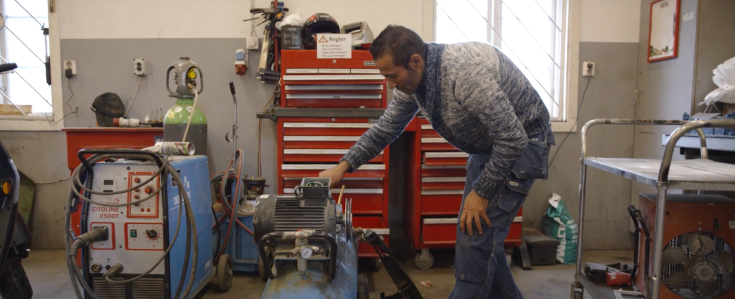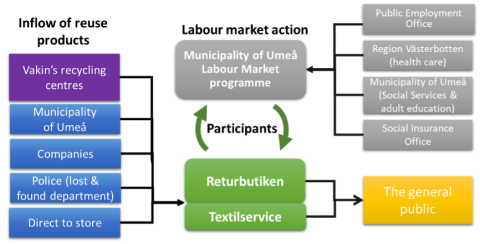Work integration social enterprises: the Swedish model

In Umeå, Sweden, environmental objectives are achieved along with social goals. The local reuse and repair shops Returbutiken and Textilservice are part of the local labour market programme aimed at generating social and economic value through work placements.
Although both businesses sell reuse products, the primary purpose of these is to provide meaningful work training to participants outside the labour market. The participants receive job training, internship, rehabilitation, vocational training, or other customised efforts to help them approach the regular labour market. The organisations have around 60 work placements per year.
The system is composed of well-functioning interaction between several actors as illustrated in the graphic below:

Work integration social enterprises, or WISE for short, can be important partners for policymakers and administrators in achieving governments' social and labour market integration goals. Labour market departments are usually in charge of practical work training and work rehabilitation services. Still, in some cases, the WISE can be more effective than the government in fulfilling such goals.
This is especially true in more remote areas where carrying out such public services might be difficult. In Sweden, WISE has been important in the local composition of labour market initiatives. For example, the Nordanstig Municipality in Central Sweden decided in 2007 to dissolve its own practical work training activities and instead collaborate with WISEs to fulfil the related social goals.
WISE – a special type of social enterprises
WISE create opportunities for people who find it difficult to get or keep a job. WISE are a type of social enterprise that focuses on improving employment prospects for those furthest from the labour market and society.
They work with disadvantaged populations such as people with disabilities, ex-convicts, ex-addicts, migrants and long-term unemployed. WISE usually provide direct employment opportunities, work training and general coaching (e.g. how to apply for a job) or rehabilitation services.
WISE primarily employ a workforce consisting of people from their target group. The goal is to prepare people for an independent future working life. WISE tend to re-invest their profits to improve the target group's integration further.
Across Europe, WISE can take various legal forms, depending on the national regulations. In some regions, they are set up as cooperatives, meaning that the participants can become co-owners of the company. Some countries like Lithuania and Slovakia have a separate legal form for organisations narrowly focused on work integration. Swedish WISE can have any form of association, although economic association is currently the most common.
According to the EC special country report on social enterprises in Sweden, Swedish WISE commonly combine their main activity with production and sales in other sectors such as cafés, catering, hotels, maintenance, carpentry, handicraft, arts, second-hand shops, and gardening. For example:
- Mamas Retro offers rehabilitative employment, education and meaningful work for women and trans people from different backgrounds far from the regular labour market while operating two second-hand stores focused on children's and maternity clothes, toys and other children's articles.
- Örebro based WISE re:form offers work training and internship through its car repair, moped and bicycle workshop, carpentry and outdoor services and a second-hand shop. Together with the RaiSE project, re:form has been featured in the video "No one is left behind" produced by Interreg Europe.
- Vägen ut! (The way out!) is a franchise chain comprising 13 WISE and employing over a hundred people. The company sells environmentally friendly products and services while creating work for individuals with mental illness, addiction/crime background, and language difficulties. The Vägen ut! WISE have agreements with several municipalities for work testing, work training and daily activities.
Notable building blocks of the Swedish WISE ecosystem
Different dedicated support initiatives to WISE also characterise the Swedish system.
Skoopi is the national interest organisation for WISE. It provides a space for partnership, collaboration and learning among Swedish WISE. Since 2018, it has provided a voluntary quality certification to WISE. The scheme has been set up in partnership with the Swedish Institute for Standards. It helps build trust and deal flow among WISE and organisations that go into (business) agreements with them.

The financial institution Mikrofonden provides loan guarantees and investments to WISE and rural development and alternative housing groups. Over the last 12 years, they have invested over 2 million Swedish krona in the social economy. On top of the financial support, Mikrofonden also offers financial coaching to improve investment readiness to support the WISEs' securement of additional funds.
Since 2015, the platform Social Trade from Västra Götaland offers WISE a chance to sell their goods and services. Over 40 social enterprises have joined the platform and have more than 400 employees and a combined turnover of 80 million Swedish krona each year. The platform helps make WISE more visible and eases their promotion and access to customers. For individuals and companies, it offers an opportunity to make socially responsible purchasing decisions.
The Swedish Public Procurement Act also allows specific procurement approaches to ease social enterprises' access to public funding. Especially suitable for WISE is the 'reserved procurement' process that enables municipalities and regions to turn to those providers for which the primary purpose is the social and professional integration of individuals with disabilities or individuals who have difficulty entering the labour market. According to the legislation, procurement can be aimed only at providers who employ at least 30% of staff with a disability or are individuals who have difficulty entering the labour market.
More information on how procurement can be used for the benefit of social enterprises can be found in the "A Handbook for Collaboration With Social Enterprises: New pathways to innovative welfare solutions" (2020) commissioned by Swedish Association of Local Authorities and Regions and written by our Interreg Europe community member Anders Bro from Region Örebro County.
Further reading
ENSIE - the European Network for Social Integration Enterprises

